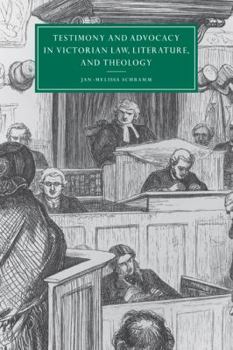Testimony and Advocacy in Victorian Law, Literature, and Theology
Select Format
Select Condition 
Book Overview
The eighteenth-century model of the criminal trial - with its insistence that the defendant and the facts of a case could 'speak for themselves' - was abandoned in 1836, when legislation enabled barristers to address the jury on behalf of prisoners charged with felony. Increasingly, professional acts of interpretation were seen as necessary to achieve a just verdict, thereby silencing the prisoner and affecting the testimony given by eye witnesses...
Format:Paperback
Language:English
ISBN:0521026350
ISBN13:9780521026352
Release Date:April 2006
Publisher:Cambridge University Press
Length:264 Pages
Weight:0.86 lbs.
Dimensions:0.6" x 6.0" x 9.0"
Customer Reviews
0 rating





